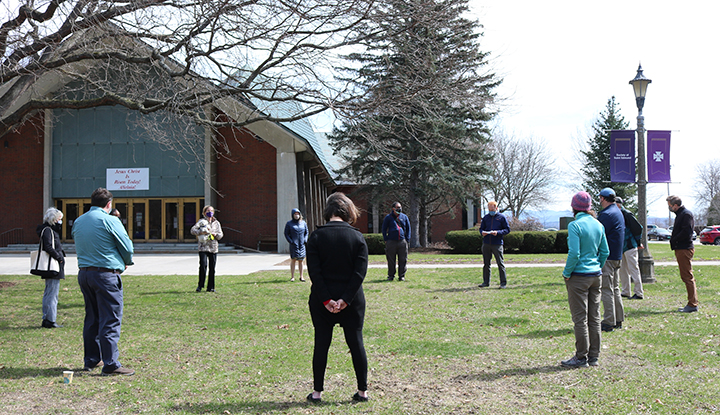
By Hannah Bishop
Staff Writer
With the recent increase in anti-racism movements and calls for racial justice locally, national and internationally, faculty and staff at St. Michael’s College have created new initiatives on campus. Two of the main groups rising to the occasion include the Racial Justice Task Force (RJTF) and the Anti-Racism Coalition (ARC).
“The creation of the RJTF was my idea,” said Margaret Bass, special assistant to the president for diversity and inclusion, and chair of the Racial Justice Task Force. “When I presented the proposal to the administration, I received complete support,” Bass explained.
“All members of the RJTF hold in common commitments to social justice and to a definition of diversity and inclusion that includes all marginalized and underrepresented populations in our nation and on our campus,” Bass said.
Bass wanted people to recognize that although we must remain vigilant with regard to diversity and inclusion, racial diversity and racial justice are two of the most apparent and urgent needs of our campus community.
“We work toward a campus community that welcomes BIPOC (Black, Indigenous, People of Color) and that fosters kindness and care for others. We also make it clear that each person has the responsibility to work toward the eradication of racial intolerance and injustice,” she explained.
Already, the group has stepped up to create change in our campus community. From the creation of several reading groups focused on anti-racism, to an affinity group for BIPOC faculty and staff, to working with departments and Human Resources toward recruiting BIPOC faculty, the Racial Justice Task Force has made an imprint on campus, and have even recruited three African American adjunct faculty members.
“Our greatest achievement, however, is the Edmundite Graduate Fellowship for African-American Scholars.”
The Edmundite Graduate Fellows Program for African American Scholars is a program that welcomes scholars in the final stages of their doctoral work to the SMC community to jumpstart their careers. Scholars are further provided a stipend of $20,000, housing, health benefits, and up to $3,000 toward relocation expenses.
This program understands that a diverse faculty enriches the learning environment as a whole by bringing underrepresented voices and perspectives into our community. “Indeed, it is the obligation of a quality liberal arts institution to include those perspectives and voices as part of the educational experience,” the program outline states.
“There’s so much work to do with regard to recruitment and retention of faculty and staff. We’re making some progress, but we need faculty departments, in particular, to support this work. I hope that SMC won’t need an RJTF in five years,” she said.
The Anti-Racism Coalition (ARC), is an emerging collective of St. Michael’s faculty and staff, who share an interest in recognizing, uprooting and dismantling racism on our campus.
Goals of the Anti-Racism Coalition aim to not only listen to BIPOC colleagues and students, but to amplify BIPOC voices, and decenter whiteness. This group hopes to learn to recognize individual and institutional racism while pursuing mindfulness and personal awareness as they stand up and speak out against racism. By working to foster partnerships with other campus groups including but not limited to The Racial Justice Task Force, Center for Multicultural Affairs & Services, and Diversity Coalition, ARC hopes to decolonize St. Michael’s by addressing the existing institutional and structural racism present on campus.
“We have a lot of faculty and staff on campus who are interested in educating ourselves and taking action to support our BIPOC community members, as well as unearthing the ways that racism lives in us as individuals and in the institutions of SMC,” said Kathy Butts, ARC member and director of counseling at Bergeron Wellness Center.
In looking to the future and reflecting on the past, Butts said she is eager to see what faculty and staff can do to decolonize themselves at the College. “There have been many efforts among us in the past, but we have had only very small successes, as we know from hearing about the lived experiences of our BIPOC community members,” she said.
Recently, the group has welcomed 70 new members. Butts is encouraged by the large numbers of faculty and staff who want to get involved, and it makes her hopeful. “The time is ripe now for more substantive change,” Butts said. Butts also noted, however, that this work is going to take a lot of effort from all areas of the college to bring about this change.
According to Trish Siplon, professor of political science and director of public health, “Racism is adaptive, complex and pervasive; that means that anti-racism efforts need to be as well. It is important to have formal structures that are explicitly anti-racist, but it is equally important for all of us to think about all the ways in our everyday lives we need to change and grow,” she said.
Siplon further articulated the role of ARC as a vehicle used to support the individual and collective efforts on our campus in addressing racism at the individual and institutional level.
Similarly to Butts, Siplon shared her feelings of hope for ARC. “The April Calendar of ARC events is a nice example of some of the work that has already been initiated by participants. I am excited that so many people have already gotten involved.”
The Racial Justice Task Force will welcome its first two Edmundite Graduate Fellowship Scholars in the 2021-2022 academic year.
The Anti-Racism Coalition will be sponsoring a Weekly Witness for Peace and Racial Justice every Monday in April, and has two meetings left for the remainder of the semester, on April 7 at 3:30 pm and on April 21 at 3:30 pm.

